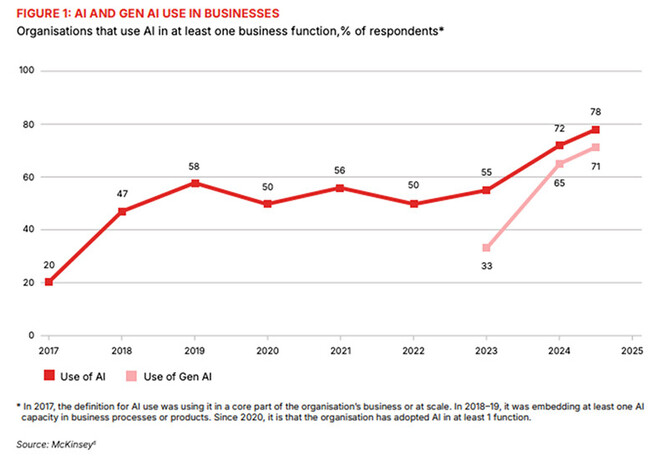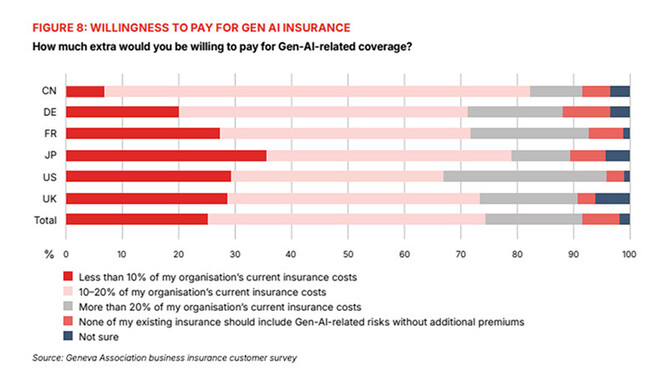According to recent reports by the Geneva Association, 90% of businesses are interested in insurance cover against Gen AI risks.
The report, released this month, surveyed 600 corporate insurance decision-makers across China, France, Germany, Japan, the UK, and the US. These findings have presented a clear opportunity signal for insurers to expand their offerings.
Generative AI (Gen AI) has seen increased use among businesses in their operations and product and service offerings. However, this rapid adoption also brings about serious risks, from cybersecurity to data leakages, and even copyright issues.
Jad Ariss, Managing Director of the Geneva Association, says that insurers play “a unique role” in the expansion of Gen AI.
“Few technologies in history have spread as rapidly as Gen AI, yet its risks are complex and poorly understood. This report provides insurers with a clearer picture of business demand for insurance protection, helping the industry anticipate needs.
Insurers have a unique role to play in ensuring that Gen AI adoption is safe and sustainable. The findings also underline the urgency for insurers, regulators, and technology providers to work together in developing frameworks that can safeguard businesses while enabling innovation to flourish across economies.”
Here are some of the highlights of the report.
Adoption is fast
The report references a McKinsey survey that states 71% of respondents have adopted Gen AI tools in at least one business function. This number was 65% in 2024 and 33% in 2023 (when Gen AI was in its early stage). The use of AI has also increased from 55% in 2023 to 78% in 2025.
In comparison to traditional AI, Gen AI can create entirely new content rather than simply analysing existing data. This has made it extremely useful for many businesses around the world.
Increase insurance demand
There’s a strong demand for insurance that can cover Gen AI risk, particularly among medium-sized to larger-sized businesses. Companies in the technology and finance sectors also record higher likelihoods of procuring coverage against these risks.
More than 90% of surveyed firms expressed interest in insurance for Gen-AI-related risks, and over two-thirds are willing to pay higher premiums for such protection. Demand is also highest for insurance that combines Gen AI risks into existing cyber insurance policies.
Additionally, over 40% of respondents have said that they would like standalone, AI-specific coverage.
Biggest Gen AI risks
There are many risks of using AI, and the most significant one on record is cybersecurity risks. More than 50% of respondents have experienced a cybersecurity threat in their organisation with Gen AI. Meanwhile, liability risk to customers and suppliers, as well as operational risks, are also cited as key concerns.
These results show that financial and legal liabilities are the main concern for many businesses, and there is a need for strong measures to protect against these liabilities.
Insurability concerns
The fluidity and ever-changing nature of Gen AI make it difficult to accurately predict what its actual risk and potential for large losses are. According to the report, AI losses should “occur randomly with somewhat identifiable frequency and severity,” which would make them a more predictable risk for insurers.
However, Gen AI has deep layers of uncertainty, as it can generate outputs leading to unforeseen circumstances, such as intellectual property violation or the spread of misinformation, which are difficult to quantify.
The report summarises that for industries like healthcare and finance, AI failure can be a catastrophic loss, making it difficult for insurers to price, underwrite, and manage exposure.
Designing AI covers
While the market for AI insurance covers is still at an early stage, insurers are deciding if it should be a policy extension or a standalone product. For example, some insurers are expanding their cyber and professional liability policies to include data contamination, copyright infringement, and AI-driven errors.
However, many insurers are also considering bundling AI-specific risk (i.e. algorithmic errors, biased outputs, and regulatory breaches) into a single product cover. This product would be somewhat similar to cybersecurity insurance, which is a more comprehensive cover.
Key takeaway
Gen AI may present challenges to insurers with insurability and underwriting, but the opportunities are there. With 9 out of 10 businesses looking to insure themselves against Gen AI risk, it is a clear signal for both insurers and their clients on the possible cybersecurity risk of the future.
Bonded NZ helps business owners remain efficient in economic uncertainties through comprehensive and tailored business insurance. If you’re looking to protect yourself against future threats, we have a range of products suitable for your needs.
For more information about our insurance coverage, contact our team today.
Read the Geneva Association report here.



